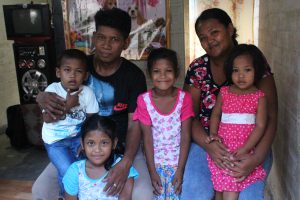
Around 20 homeless families are now proud owners of decent homes in Barangay Kalunasan, Cebu City.
Through the partnership of the Department of Social Welfare and Development (DSWD) and the Pagtambayoyong Foundation, Inc., these former street-dwellers who are partner-beneficiaries of the Modified Conditional Cash Transfer (MCCT) program can now raise their children in safe, low-cost housing units.
The MCCT program targets beneficiaries who are not covered by the regular Pantawid Pamilyang Pilipino Program (4Ps) since they are in need of special protection.
As of August 2017, there are 230,635 active MCCT partner-beneficiaries nationwide which include street families, indigenous families and families affected by disasters.
“Malipayon ko nga ang among pamilya magpuyo na gyud sa usa ka balay. Among kaugalingong balay. Sa una man gud, sementeryo ra gyud ang nahimo namong pinuy-anan (I am happy that our family will now live in a real house. Before, Carreta cemetery used to be our dwelling place),” said Arlene F. Ramirez, 32, one of the beneficiaries.
Since she was two years old, Arlene has lived in a graveyard with her parents. When she became an adult and began to raise a family of her own, she promised to herself that one day she will find a decent home where her children can grow.
Arlene is one of the MCCT beneficiaries of DSWD Field Office (FO) VII who now receive a rent subsidy for a maximum of P4,000 per month up to 12 months.
The Pagtambayoyong Foundation agreed to a rent-to-own scheme for 20 pilot beneficiaries, including Arlene. The foundation has also provided opportunities for them to augment their income by teaching them how to make chorizo.
“Karon nga aduna na mi kaugalingon balay, paningkamotan namo sa akong bana nga mapadayon kini aron dili na mi mobalik sa sementeryo (Now that we have the means to rent and one day own a real house, my husband and I have to strive hard to be able to continue paying the house rental to ensure we no longer go back to the cemetery),” said Arlene.
She now juggles work and family by making chorizo and selling rugs to help her husband, who works as a roof installer, to support the needs of their four children.
Like the Pagtambayoyong Foundation, the DSWD hopes to collaborate with more private organizations and other stakeholders to help them to provide assistance to the needs of homeless individuals and families by providing them basic needs such as food, shelter, clothing, water, as well as, livelihood opportunities. ###


